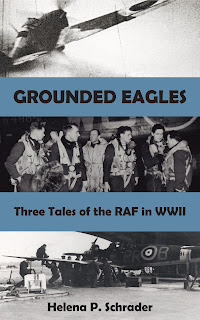There is probably no other genre of fiction which requires quite so much research as historical fiction. Indeed, many readers will be surprised to hear that the research required for writing good historical fiction is more comprehensive than that for writing straight history.

Over the years, I've done a lot of historical research. I did academic research for my dissertation. I did research for non-fiction histories on women pilots, the Berlin Airlift and, most recently, the crusader states. Each research project was unique and each came with its own set of challenges and rewards. The availability of primary sources varies from era to era and topic to topic. Access to visual records -- paintings and photographs -- can be radically different and the ability to visit locations or experience modes of transport depend on a variety of factors. Yet, without question the research required for a work of non-fiction was more narrowly focused than for fiction. Academic research particularly is about putting forward a new thesis or uncovering new sources for what is inevitably a narrow, highly specialized topic.
A writer of historical fiction, on the other hand, has to understand -- and be able to describe -- the entire world in which the characters live. For example, my non-fiction comparison of women pilots in WWII looked in detail at the process for recruiting, training, and employing women pilots in the UK and the US. It catalogued their rates of pay, their accomplishments, the public and official recognition they received. But it did not -- and did not need to -- talk about contemporary fashion, food, film and music. There was no need to discuss rationing or politics or social mores. Yet a novel featuring women pilots would need to depict these "extraneous" things and all of them would need to be research.
In addition, when writing non-fiction, an author uses her own voice. This can be as contemporary, chatty and informal or as sophisticated and erudite as the author wants. The author can decide what tone to set and what vocabulary to use. In a novel, in contrast, the characters speak (at least some of the time) and they have to sound like men and women not of the present but the age in which the novel is set. This is more than a matter of avoiding anachronisms, it is about learning what the contemporary slang, jargon, swear-words etc. were.
As a reader, I have repeatedly been irritated by historical novelists who don't do their homework with regard to these atmospherics. Too many novice historical novelists stop doing research when they know the chronology of key events. Others get both the facts and the window-dressing right (i.e. fashions, technology), but they don't take the time to learn about the "soft" or more amorphous features of the age and society in which their novel plays out. Yet an understanding of legal systems, religious beliefs, social customs and sexual mores, for example, are arguably far more important than getting the cut of the dresses right.
Fortunately for me, I love doing historical research precisely because it opens to many doors and provides so many insights into the diversity and complexity of the human experience.
they took the war to Hitler.
Their chances of survival were less than fifty percent.
Their average age was 21.
This is the story of just one bomber pilot, his crew and the woman he loved.
It is intended as a tribute to them all.
or Barnes and Noble.

"Where Eagles Never Flew" was the the winner of a Hemingway Award for 20th Century Wartime Fiction and a Maincrest Media Award for Military Fiction. Find out more at: https://crossseaspress.com/where-eagles-never-flew
For more information about all my books visit: https://www.helenapschrader.com



No comments:
Post a Comment